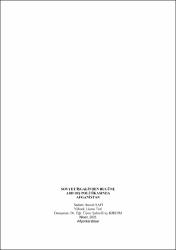| dc.contributor.advisor | Kırdım, Şahin Eray | |
| dc.contributor.author | Safi, Sadam Hussin | |
| dc.date.accessioned | 2021-12-21T07:38:08Z | |
| dc.date.available | 2021-12-21T07:38:08Z | |
| dc.date.issued | 2020 | en_US |
| dc.date.submitted | 2020 | |
| dc.identifier.uri | https://hdl.handle.net/11630/9803 | |
| dc.description.abstract | Günümüz uluslararası sisteminde ABD’nin dış politikası bu sistemin bir parçası olan tüm devlet ve kuruluşları yakından ilgilendirmektedir. Zira Soğuk Savaş’tan sonra süper güç olarak ortaya çıkan ABD, uluslararası sistemin birçok alanında büyük söz sahibidir. Bu çalışmada ABD’nin dış politikası Afganistan örneği üzerinden değerlendirilecektir. Bunu yaparken ilk olarak ABD’nin dış politikasının kökenlerine ve gelişimine değinilecektir. Afganistan’daki SSCB işgaline kadar olan dönemde ABD’nin dış politikası Soğuk Savaş dinamikleri üzerinden yön bulmaktaydı ve SSCB’nin dağılmasının ardından bu politika büyük bir değişime uğramıştır. Süper güç olarak ABD’nin dünya genelinde nüfuz ve kontrol sağlama çabaları kendini en çok Ortadoğu bölgesinde göstermiştir. İşgal süresince ve sonrasında ABD jeo-stratejik konumu oldukça önemli olan Afganistan’a özel bir ilgi göstermiştir ve işgal süresince ülkede, komünizme karşı İslam dinini bir kalkan olarak kullanmıştır. Fakat 11 Eylül’e gelindiğinde ABD’den büyük destekler alan bu İslamcı gruplar Amerikan dış politikasının en büyük düşmanları haline gelmişlerdir. ABD Afganistan politikasını SSCB işgali öncesi, işgal sırasında ve işgal sonrası olmak üzere üç bölüme ayırarak incelemek en doğrusu olacaktır. ABD Afganistan politikası işgal öncesi jeo-stratejik konuma odaklanırken, işgal süresince SSCB ve komünizm tehdidine göre şekillenmiştir. İşgal sonrası süreçte ise özellikle 11 Eylül saldırılarının ardından küresel terörizmle mücadele, Usame bin Ladin’in ele geçirilmesi ve Taliban tehdidinin ortadan kaldırılması yönünde şekillenmiştir. Günümüzde ise Afganistan topraklarında halen ABD askeri varlığı mevcuttur fakat 2010’lu yıllar itibariyle uzlaşı ortamı oluşmaya başlamış ve barış süreci hızlandırılmıştır. | en_US |
| dc.description.abstract | In today’s international system, the foreign policy of the USA is closely related to all states and organizations that are part of this system. The USA, which emerged as a superpower after the Cold War, has a great say in many areas of the international system. In this study, the foreign policy of the USA will be evaluated on the example of Afghanistan. While doing this, the origins and development of the foreign policy of the USA will be mentioned first. In the period until the occupation of the USSR in Afghanistan, the foreign policy of the USA had been guided by the Cold War dynamics, and this policy has undergone a great change after the collapse of the USSR. As a superpower, the efforts of the USA to gain influence and control around the world are mostly seen in the Middle East region. During and after the invasion, the USA showed a special interest in Afghanistan, where its geo-strategic position was very important, and during the occupation, the USA used Islam as a shield against communism. However, by September 11, these Islamist groups, which received great support from the USA, became the biggest enemies of American foreign policy. It would be best to examine the US Afghanistan policy in three parts: before, during and after the USSR occupation. The US Afghanistan policy focused on the geo-strategic position in the pre-occupation period, and it was shaped according to the threat of the USSR and communism during the occupation. In the post-occupation period, especially after the September 11 attacks, it shaped by the fight against global terrorism, capturing Osama bin Laden and eliminating the Taliban threat. Today, there is still a US military presence on the territory of Afghanistan, but as of 2010’s a reconciliation environment has begun to form and the peace process has been accelerated. | en_US |
| dc.language.iso | tur | en_US |
| dc.publisher | Afyon Kocatepe Üniversitesi Sosyal Bilimler Enstitüsü | en_US |
| dc.rights | info:eu-repo/semantics/openAccess | en_US |
| dc.subject | Afganistan | en_US |
| dc.subject | Amerikan Dış Politikası | en_US |
| dc.subject | Sovyet Afganistan İşgali | en_US |
| dc.subject | Küresel Terörizm | en_US |
| dc.title | Sovyet işgalinden bugüne ABD dış politikasında Afganistan | en_US |
| dc.title.alternative | Afghanistan in us foreign policy since the ussr occupation | en_US |
| dc.type | masterThesis | en_US |
| dc.department | Enstitüler, Sosyal Bilimler Enstitüsü, Siyaset Bilimi ve Kamu Yönetimi Ana Bilim Dalı | en_US |
| dc.relation.publicationcategory | Tez | en_US |
| dc.contributor.institutionauthor | Safi, Sadam Hussin | |



















